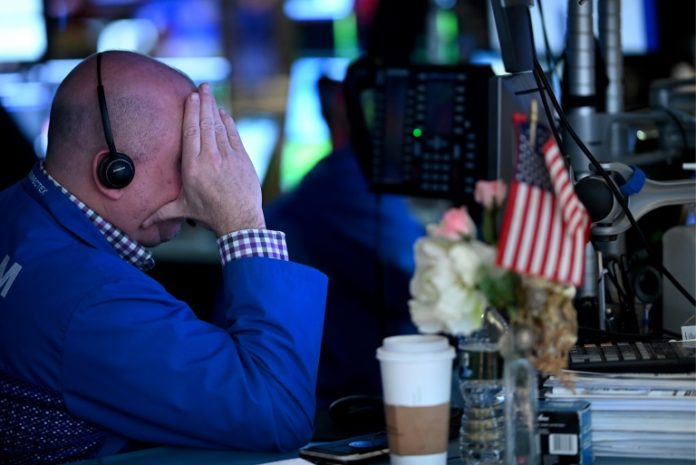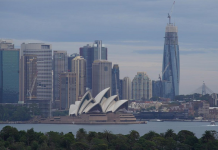Asian equities went into meltdown on Friday, extending a global rout that saw markets experience their worst day in decades as fears of a worldwide recession caused by the coronavirus pandemic wiped trillions off valuations.
Shellshocked investors fled for the hills as governments across Europe and in the United States struggled to get a grip on the crisis that has swept the planet and shut communities down.
Central bank moves to support financial markets have also failed to staunch the bloodletting, while Donald Trump’s decision to shut the US border to European travellers added to the panic.
“Markets remain in a freefall as uncertainty persists with no reliable anchor which can create near-term stability,” Ben Emons, at Medley Global Advisors in New York, said.
Tokyo fell as much as 10 percent at one point before edging back slightly, Seoul tanked eight percent and Mumbai fell more than nine percent. Hong Kong went into the break down 5.8 percent, while Sydney, Singapore, Wellington, Jakarta and Manila were between four and five percent off.
Bangkok dropped more than seven percent, with Taipei and Kuala Lumpur more than six percent down.

Shanghai was the least affected by the meltdown, falling a little more than three percent as the number of new cases in China, the centre of the outbreak, shrinks and people slowly return to work in the worst-hit areas.
The selling led to brief trading halts in Seoul, Mumbai, Bangkok and Jakarta.
The losses follow a virtual implosion on Wall Street and in Europe.
The Dow lost 10 percent in its worst session since 1987, while London also had its worst day since that year. Frankfurt had its blackest day since 1989, the year the Berlin Wall fell, while Paris suffered its biggest one-day loss on record.
Analysts said Trump’s ban on travel from Europe deeply rattled investors, and measures intended to shore up business and markets were proving insufficient.
The New York Federal Reserve announced measures to inject an additional $1.5 trillion into financial markets this week and launch a modest bond-buying programme, while the European Central Bank unveiled emergency efforts but did not include an interest rate cut.
“The turmoil in markets has moved up another notch over the past 24 hours with President Trump’s European travel ban and underwhelming stimulatory measures adding more fuel to the fire of uncertainty, instead of providing a dose of reassurance,” wrote National Australia Bank’s senior FX strategist Rodrigo Catril.

“New containment measures to slow the spread of COVID-19 have increased the prospect of a severe global economic growth downturn,” he added.
The crisis has hit stocks across the board, with the travel industry taking an especially heavy blow as new restrictions prompt mass cancellations, while sporting events have been scrapped around the world and everything from museums to Disney theme parks have shut their doors.
The crisis has raised fears of a global recession, with significant uncertainty about how bad the economic fallout might become.
“In mere weeks, the market has shifted gears from a transitory health scare to a full-blown global recession,” wrote Stephen Innes, chief market strategist at AxiCorp.
“Global supply chains are no longer just ‘disrupted’ but are now in the process of shutting down completely,” he added.
“And even more worrisome is that the worst-case scenario and the sum of all fears are culminating with the view that policymakers remain well behind the curve.”

Markets have also been shaken by an oil price war between Saudi Arabia and Russia, compounded by fears that travel restrictions will further dampen energy demand.
Both main contracts, which have collapsed in their worst week since the financial crisis in 2008, were down around one percent.
On currency markets, the dollar surged against high-yielding, riskier units and hit a record high against the Indian rupee while the South Korean, Australian and Canadian dollars, Thai baht, and South African rand were all more than one percent down.
The greenback was up more than two percent on the Indonesian rupiah, while it also rose against the yen despite the Japanese unit’s safe-haven position.
Jeffrey Halley, senior market analyst at OANDA, added: “Most worryingly, US bond yields rose… when really the situation was ripe for a mass stampede to the US Treasury market driving down yields.
“That suggests two things: One, credit is tightening – a gruesome scenario for business. Two, investors are now moving to the ultimate haven, hoarding cash in boxes under the bed.”
Tokyo – Nikkei 225: DOWN 8.0 percent at 17,074.85
Hong Kong – Hang Seng: DOWN 5.8 percent at 22,904.28 (break)
Shanghai – Composite: DOWN 3.3 percent at 2,826.37 (break)
Dollar/yen: UP at 105.03 yen from 104.79 yen at 2100 GMT
Euro/dollar: UP at $1.1211 from $1.1179
Pound/dollar: DOWN at $1.2550 from $1.2557
Euro/pound: UP at 89.32 pence from 88.96 pence
Brent North Sea crude: DOWN 1.1 percent at $32.86 per barrel
West Texas Intermediate: DOWN 1.0 percent at $31.19 per barrel
New York – Dow: DOWN 10.0 percent at 21,200.62 (close)
London – FTSE 100: DOWN 10.9 percent at 5,237.48 (close)
















